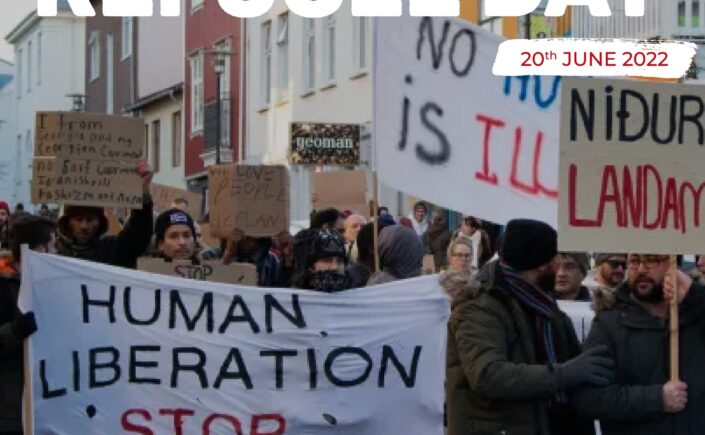Versión en Español
La Unión Internacional de Juventudes Socialistas (IUSY, por sus siglas en inglés), manifiesta gran preocupación por la situación política, económica y social de la Argentina.
El Gobierno nacional, con una grave irresponsabilidad, somete al pueblo argentino a las vicisitudes de su propia interna entre el Presidente Alberto Fernández y su Vicepresidenta Cristina Fernández de Kirchner. La renuncia del Ministro de Economía Martin Guzmán es la consecuencia más evidente y peligrosa de esta pelea, la cual provocó un aumento de 308 puntos en el Riesgo País y una disparada del precio real del dólar.
Esto significa más pobreza y más inflación, que es la más elevada en treinta años y que castiga siempre a los más débiles. A dos años y medio de haber asumido, aún no existe un plan económico, ni claras posiciones acerca de las reformas que necesita el país, ni compromiso político para efectuar el llamado a la concertación con las demás fuerzas políticas.
Condenamos, como juventudes comprometidas y activas, los deliberados ataques a la institucionalidad argentina, ya sea que éstos se encarnen en figuras del mismo partido gobernante, o en peligrosas expresiones de derecha, o en importantes medios de comunicación que a estas últimas responden.
El pueblo argentino se encuentra abatido y sumergido en esta crisis que atraviesa todas las facetas de la vida pública y privada. En Argentina existe un manifiesto abandono educativo; una pobreza escalofriante, que alcanza a la mitad de la población y casi 7 de cada 10 niños en el conurbano bonaerense; una inseguridad angustiante, debida, fundamentalmente, al avance del narcotráfico; una inflación histórica que ya ha superado el 60% interanual; un preocupante desabastecimiento de gasoil, necesario para el transporte de la producción agrícola.
Todo ello se suma a los problemas estructurales que el Gobierno nacional, lejos de revertirlos, los pronuncia. Entre ellos, Argentina sufre con un sistema judicial corrompido, que lejos está del valor republicano de tener una justicia independiente de intereses políticos y económicos. Cuenta con un sector formal del trabajo marcadamente débil, en un país con la mitad de sus trabajadores en el sector informal, con institutos jurídicos que carecen de capacidad para velar por los intereses de los y las trabajadoras. Existen daños ambientales terribles y que se consolidan como irreversibles, como en la provincia de Córdoba, donde ya se perdió el 95% del bosque nativo, o en la región litoral del Paraná, con quemas de humedales y sequías históricas, todo ello producido por la falta de control estatal.
Nuestro llamado, entonces, apunta a que el Gobierno nacional aporte responsabilidad y cordura ante esta dramática situación. A que ponga por delante los intereses de todo el pueblo argentino, y no sus propias internas. A que convoque a una gran concertación nacional, haciendo lo necesario para darle al país un programa y una vida pública seria, comprometida, solidaria y democrática.
IUSY expresses its concern about the economic, political and social situation in Argentina.
English Version
The International Union of Socialist Youth (IUSY) expresses great concern about the political, economic and social situation in Argentina.
The national government, being irresponsible, submits the argentines to the vicissitudes of its own internship between President Alberto Fernández and his Vice President, Cristina Fernández de Kirchner. The resignation of Economy Minister, Martin Guzmán, is the most obvious and dangerous consequence of this fight, which caused an increase of 308 points in Country Risk and a huge rise of the price of the dollar.
This scenario caused more poverty and more inflation that punishes the weakest ones, the highest in thirty years. Two and a half years after taking office, there is still no economic plan, no clear positions on the reforms the country needs, and no political commitment to make the call for agreement with the other political forces.
We condemn the deliberate attacks on Argentine institutions, whether they are embodied by figures from the ruling party itself, or by dangerous right-wing expressions, or by important media outlets that respond to the latter.
The Argentines are dejected and submerged in this crisis that crosses all facets of public and private life. In Argentina there is an abandonment of education; a chilling poverty, which reaches half of the population and almost 7 out of 10 children in the suburbs of Buenos Aires; distressing insecurity, fundamentally due to the advance of drug trafficking; historical inflation that has already exceeded 60% year-on-year; a worrying shortage of diesel, necessary for the transport of agricultural production.
There are also structural historical problems that the national government is pronouncing. Argentina suffers from a corrupt judicial system, which is far from the republican value of having justice independent of political and economic interests. It has a markedly weak formal labor sector, in a country with half of its workers in the informal sector, with legal institutes that lack the capacity to look after the interests of workers. There are terrible environmental damages that are consolidated as irreversible, as in the province of Córdoba, where 95% of the native forest has already been lost, or in the coastal region of Paraná, with the burning of wetlands and historical droughts, all of this caused by the lack of state control.
For all the said before, IUSY request the national government to provide responsibility in the face of this dramatic situation. To put forward the interests of the entire Argentine people, and not their own internal ones. We ask to call for a great national agreement, doing what is necessary to give the country a program and a serious, committed, supportive and democratic public life.
IUSY exprime sa préoccupation face à la situation économique, politique et sociale en Argentine.
Version française
L’Union internationale de la jeunesse socialiste (IUSY) exprime sa grande inquiétude face à la situation politique, économique et sociale en Argentine.
Le gouvernement national, avec une grave irresponsabilité, soumet le peuple argentin aux vicissitudes de son propre internat entre le président Alberto Fernández et sa vice-présidente Cristina Fernández de Kirchner. La démission du ministre de l’Économie Martin Guzmán est la conséquence la plus évidente et la plus dangereuse de cette lutte, qui a provoqué une augmentation de 308 points du risque pays et une flambée du prix réel du dollar.
Cela signifie plus de pauvreté et plus d’inflation, qui est la plus élevée depuis trente ans et qui punit toujours les plus faibles. Deux ans et demi après son arrivée au pouvoir, il n’y a toujours pas de plan économique, pas de positions claires sur les réformes dont le pays a besoin, et pas d’engagement politique pour faire l’appel à l’accord avec les autres forces politiques.
Nous condamnons, en tant que jeunesse engagée et active, les attaques délibérées contre les institutions argentines, qu’elles s’incarnent dans des personnalités du parti au pouvoir lui-même, ou dans des expressions de droite dangereuses, ou dans d’importants médias qui répondent à ces dernières.
Le peuple argentin est abattu et submergé par cette crise qui traverse toutes les facettes de la vie publique et privée. En Argentine, il y a un abandon scolaire manifeste ; une pauvreté glaçante, qui touche la moitié de la population et près de 7 enfants sur 10 dans la banlieue de Buenos Aires ; une insécurité affligeante, due essentiellement à la progression du trafic de drogue ; une inflation historique qui a déjà dépassé 60% en glissement annuel ; une pénurie inquiétante de gasoil, nécessaire au transport de la production agricole.
Tout cela s’ajoute aux problèmes structurels que le gouvernement national, loin de renverser, prononce. Parmi eux, l’Argentine souffre d’un système judiciaire corrompu, loin de la valeur républicaine d’une justice indépendante des intérêts politiques et économiques. Il a un secteur du travail formel nettement faible, dans un pays avec la moitié de ses travailleurs dans le secteur informel, avec des instituts juridiques qui n’ont pas la capacité de s’occuper des intérêts des travailleurs. Il y a de terribles dommages environnementaux qui sont consolidés comme irréversibles, comme dans la province de Córdoba, où 95% de la forêt indigène a déjà été perdue, ou dans la région côtière de Paraná, avec l’incendie des zones humides et les sécheresses historiques, toutes causées par l’absence de contrôle étatique.
Notre appel pointe donc vers le gouvernement national qui doit faire preuve de responsabilité et de bon sens face à cette situation dramatique. Mettre en avant les intérêts de tout le peuple argentin, et non les leurs. Appeler à une grande entente nationale, faire le nécessaire pour donner au pays un programme et une vie publique sérieuse, engagée, solidaire et démocratique.






